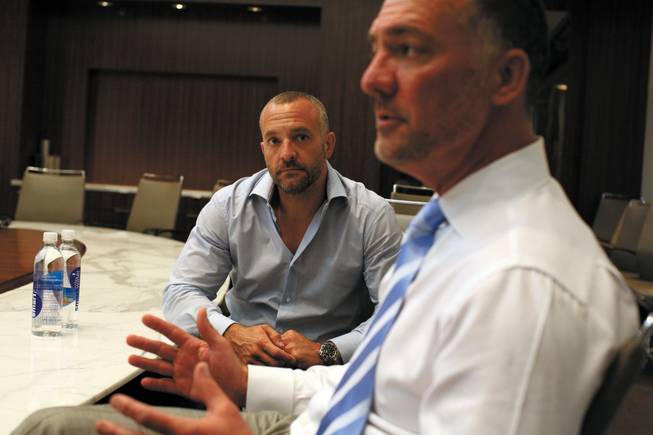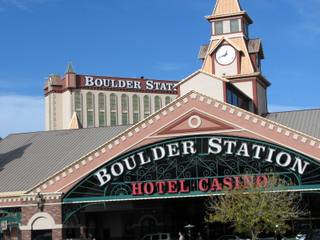Sunday, Aug. 15, 2010 | 2 a.m.
Sun archives
- Fertitta family, lenders maintain highest bid for Station Casinos properties (8-5-2010)
- Station Casinos, bondholders settle dispute (7-28-2010)
- Station Casinos bondholders renew interest in suing over deal (7-9-2010)
- New objections filed in Station Casinos bankruptcy case (7-2-2010)
- Station Casinos, Herbst Gaming fight bondholders in bankruptcy cases (6-17-2010)
- Station Casinos bondholders seek delay in auction process (6-9-2010)
- Judge OKs Station Casinos’ plan to sell 11 casinos (5-28-2010)
- Judge deals blow to Culinary Union effort in Station Casinos bankruptcy case (5-27-2010)
- New objections filed to Station Casinos bankruptcy plan (5-25-2010)
- Station Casinos loses $53.5 million in first quarter (5-17-2010)
- Station Casinos: No competitive advantage under bankruptcy plan (4-29-2010)
- Station Casinos: Boyd Gaming meddling in bankruptcy case (4-28-2010)
- Boyd Gaming objects to Station Casinos reorganization plan (4-22-2010)
- Union-backed group critical of Station reorganization plan (4-21-2010)
- Creditors attack Station Casinos bankruptcy plan (4-21-2010)
- Key lenders agree to Station Casinos reorganization plan (4-19-2010)
- Station Casinos asks judge for extension in bankruptcy case (4-8-2010)
The Fertitta family may well end up running the Station Casinos empire it founded, even after putting more than $6 billion in debt onto the company in 2007 as the economy worsened and sending it into bankruptcy.
The prospect has many people scratching their heads, questioning the fairness of keeping the Fertittas at the helm of a company they made vulnerable to a downturn.
The Station bankruptcy, one of many Chapter 11 cases to hit the gaming industry in the recession, is one of the largest and most complex in the western United States.
It’s also been one of the most contentious, as lenders will lose nearly $4 billion in the process of helping the company reduce its debt to a more manageable $2 billion. Unlike some recent casino bankruptcies in which owners lacked the cash to negotiate with lenders for a stake in their companies, the Fertittas — experts in a uniquely Las Vegas enterprise they have dominated for years — dug into their pockets so as not to lose everything to lenders or competitors.
A bankruptcy judge this month approved a bid, backed by Frank and Lorenzo Fertitta and the company’s primary bank lenders, for a portion of Station’s assets.
Similar scenarios have been blessed by bankruptcy judges in the past and agreed upon by lenders locked in battles for cents on the dollar.
More than a decade ago, bankruptcy judges approved reorganization plans allowing executives to maintain an ownership stake in their companies despite not having enough money to pay lenders what they were owed.
Although the old rules of bankruptcy say that equity owners lose everything and companies pay off creditors who are first in line, the so-called new value exemption allows owners to maintain an equity stake if they put new money into the bankrupt company.
“If you don’t have enough money to pay everybody and instead you have to pay people according to priority in bankruptcy, owners are last on the list and are typically wiped out,” said Nancy Rapoport, a bankruptcy law professor at UNLV.
But “owners didn’t love that idea” and started proposing ways to retain some control in their companies in exchange for putting in more cash, Rapoport said.
In Station’s case, bondholders complained that the $8.8 billion management-led buyout in 2007 to take the company private put too much debt on it and unfairly squeezed out lower-tier investors who had no say in the deal.
Station executives have argued that they could not have foreseen the recession and that the debt was appropriate given profit projections at the time.
Regardless of anyone’s interpretation of events, the new value exemption has been blessed by bankruptcy judges as fair and so ends up being begrudgingly accepted by lenders who are lower on the payment list, Rapoport said.
In the fight to control an unprecedented casino empire involving 18 locals casinos, bondholders who stood to lose the most in the Station bankruptcy complained early and loudly that the proceedings were rigged in favor of the Fertitta family.
The Fertittas may have had a leg up because of their intimate knowledge of the company Frank Fertitta Jr. founded in 1976. The two sons took their father’s small operation and created a chain that dominates the Las Vegas market, gaining knowledge that would be valuable to lenders unable to run a casino company.
And yet, the bankruptcy process favored the lead lenders, including Deutsche Bank, because they had obtained foreclosure rights over many of Station’s casinos.
Deutsche Bank, Station’s primary lender, helped finance the $8.8 billion management-led buyout to take Station private. The Fertitta family, with select Station executives, had a 24 percent stake in the private company and retained operational control. Private-equity giant Colony Capital owned 76 percent of the company. While putting up a minority of the money, the Fertittas — with their management expertise — would continue to run the business.
The Deutsche Bank-led institutions that helped engineer management’s takeover of Station would end up with mortgages on Station’s best assets after it was split in two. Deutsche Bank and other banks received first mortgages on Station’s four most profitable casinos — Red Rock Resort, Palace Station, Boulder Station and Sunset Station. Now holding $2.5 billion in mortgage debt on those casinos, the banks had the right to take ownership of the properties in bankruptcy, enabling some payoff for their investment.
The second part of the company consisted of smaller or less-profitable casinos, including Santa Fe Station, Texas Station, Fiesta Rancho, Fiesta Henderson and three Wildfire casinos. Some of the same lenders, including Deutsche Bank, also received collateral in certain properties in this group, which served as collateral for a $900 million loan. Unlike the prime assets, which they wanted to keep, Deutsche and the other banks decided to auction off these lesser properties and other assets, such as vacant land and casino management contracts with Indian tribes, to see if they could get more money for them.
When the market turned and casino earnings plummeted, the Deutsche Bank-led institutions prepared to foreclose on their four casinos, although they turned to the Fertittas to continue managing the properties. In the meantime, Station’s main competitor, Boyd Gaming, approached the lenders in an attempt to come up with a competitive offer for the properties.
In the end, the Fertittas agreed to put in $85.6 million for a 46 percent stake in a new casino ownership company — the same entity that made the successful bid for Station’s remaining, less-profitable assets. The Fertittas will have the largest ownership stake in the new company, with Colony owning 4 percent.
Including the $74 million in cash they are contributing to the $772 million bid for the less-profitable properties, the Fertittas are coming up with a total of $160 million in cash to buy into the new company that will emerge from bankruptcy.
Much of the early criticism of the bankruptcy process came from bondholders owed $2.8 billion, who are “unsecured” lenders with no collateral for their loans. Their investment was completely wiped out. These bondholders recently agreed to drop a fraud lawsuit against Station for its overleveraged buyout deal, and will invest up to $100 million in the new company for an equity stake of 15 percent in exchange for signing on to the bankruptcy plan.
The fight isn’t over yet. A splinter group of dissident lenders with a piece of the less-profitable assets has not yet signed on to Station’s bankruptcy plan. It will go before Bankruptcy Judge Gregg Zive in Reno for his approval Aug. 27. These lenders are part of the group receiving $772 million for the nearly $900 million they are owed.
Although most creditors eventually agree to bankruptcy plans in exchange for fees or other concessions thrown their way in the last stages, some are “angry enough that they continue to fight,” said Rapoport, who isn’t involved in the Station case.
The longer the fight drags on, the more the dissidents start to question whether the cause is worth their time and money, however, she said.
“Attorney fees come out of the estate. So they have to ask themselves, ‘Is it worth it? How strongly do we feel about it? Why throw good money after bad?’ ”
By definition, bankruptcies are contentious because lenders aren’t getting paid what they were promised — especially bondholders at the bottom of the list, Rapoport said.
“They’re angry to begin with, so they are naturally distrustful of the (bankruptcy) process.”
There will be losses all around.
The Fertitta family is losing the $900 million it put into the company to take it private — although it cashed out
$1.5 billion in stock in the 2007 deal that offered all Station shareholders $90 per share. Specifically, Frank and Lorenzo Fertitta will lose about $700 million in bankruptcy, retaining $300 million from the 2007 sale of Station stock.
The Deutsche Bank-led group with collateral in the prize properties will take a smaller loss. Its $2.5 billion mortgage loan goes away, and it will receive a new loan for $1.6 billion.
That’s small compared with the $2.8 billion bath taken by bondholders who are choosing to stake more money on the future resurgence of a Fertitta-led Station Casinos.
CORRECTION: This story originally said the company was founded in 1972. It has been corrected and changed to 1976. | (August 18, 2010)



Join the Discussion:
Check this out for a full explanation of our conversion to the LiveFyre commenting system and instructions on how to sign up for an account.
Full comments policy